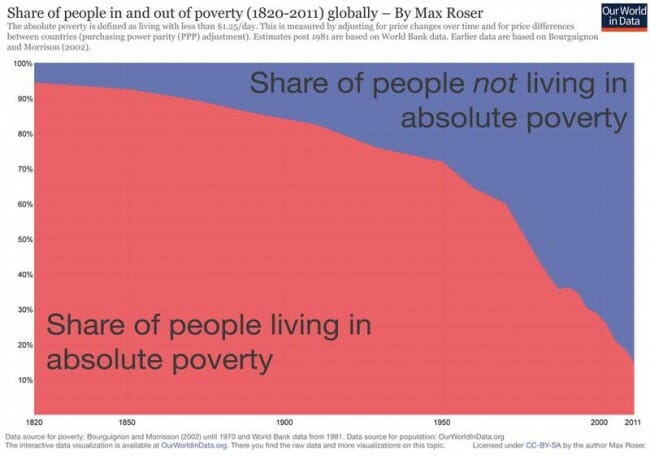Memo to Vox: You Know How This Prosperity Was Achieved? We Let it Happen.
Vox shares what is perhaps the greatest achievement in human history, the continuing disappearance of absolute poverty:
Readers of this blog will likely have seen this before (though it may well be new to Vox readers). Here is the amazing thing about the Vox article: It never once mentions capitalism, trade, economic freedom, or any synonym. Here is a sampling of the tone of the accompanying article:
There's still much work to be done: 14.4 percent of the world amounts to 1 billion people who still need to be lifted out of extreme poverty. And making sure everyone's making at least $1.25 a day isn't the end of the fight either. The world's median income is still only $3 to $4 a day. By comparison, the poverty line in the US for a family of four is $16.61 per person per day. Once under-$1.25-a-day poverty is eradicated, the world needs to set about eradicating under-$15-a-day poverty, which will be a substantially harder task.
Vox is treating this like it is the result of some top-down effort, using the same language one might use to describe the eradication of Yellow Fever in Panama. As if this resulted (and as if future progress depended on) some all-hands-on-deck technocratic government program.
No one "set about" eradicating poverty. It happened because governments, at least to some extent, got out of the way and didn't stop it. China is a great example. Mao "set about" trying to eliminate poverty using many of the approaches likely favored by the Vox staff, and killed a few tens of millions of people in the process.
Here is my theory of the world's accelerating wealth formation that I have written on a number of times before. This chart largely results from:
- There was a philosophical and intellectual change where questioning established beliefs and social patterns wentfrom being heresy and unthinkable to being acceptable, and even in vogue. In other words, men, at first just the elite but soon everyone, were urged to use their mind rather than just relying on established beliefs and appeals to authority.
- There were social and political changes that greatly increased the number of people capable of entrepreneurship. Before this time, the vast vast majority of people were locked into social positions that allowed them no flexibility to act on a good idea, even if they had one. By starting to create a large and free middle class, first in the Netherlands and England and then in the US, more people had the ability to use their mind to create new wealth. Whereas before, perhaps 1% or
less of any population really had the freedom to truly act on their ideas, after 1700 many more people began to have this freedom.
So today's wealth, and everything that goes with it (from shorter work hours to longer life spans) is the result of more people using their minds more freely.

There's a solution to this problem. Claim absolute poverty is meaningless, and that 'relative' poverty is more important. Even if you live in physical comfort, in a safe neighborhood, with enough food on the table, and a good job, you could be 'poor', relative to a billionaire. The mere existence of that billionaire can diminish your material circumstances, requiring radical social restructuring and punitive taxation of the rich. In the end, you and the billionaire will be less wealthy, but just so long as the relative gap between you is closed, this will be viewed as "progress".